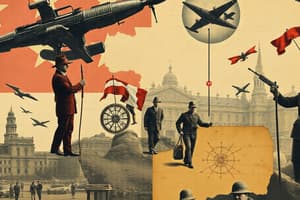Podcast
Questions and Answers
What were the main long term causes of the First World War?
What were the main long term causes of the First World War?
Militarism, Imperialism, Nationalism and the Alliances.
What were the short term causes of WWI?
What were the short term causes of WWI?
Bosnian Crisis, Balkan Wars and the Moroccan Crises.
What was known as the spark?
What was known as the spark?
The assassination of Archduke Franz Ferdinand.
Which country was greedy for an overseas empire?
Which country was greedy for an overseas empire?
Which country was the first to break off from the Austrian Hungarian empire?
Which country was the first to break off from the Austrian Hungarian empire?
Who supported the Serbians?
Who supported the Serbians?
What was the arms race?
What was the arms race?
Who were the Triple Entente?
Who were the Triple Entente?
Who were the Triple Alliance?
Who were the Triple Alliance?
What was the Dreadnought?
What was the Dreadnought?
Which country did Germany attack France through?
Which country did Germany attack France through?
How many BEFs died?
How many BEFs died?
Study Notes
Long Term Causes of WWI
- Militarism: Nations increased military spending and arms production, leading to heightened tensions.
- Imperialism: Competition for overseas colonies intensified rivalries, particularly involving Germany and other European powers.
- Nationalism: National pride and ethnic tensions contributed to desires for independence and territorial expansion.
- Alliances: Complex alliances between countries created an environment where conflict could quickly escalate.
Short Term Causes of WWI
- Bosnian Crisis: Tensions arose from Austria-Hungary's annexation of Bosnia and Herzegovina, angering Serbia and Russia.
- Balkan Wars: Conflicts in the Balkan region increased instability, with nations vying for territory and influence.
- Moroccan Crises: Disputes over Morocco strained relations between Germany and France, exemplifying imperial rivalries.
The Spark of WWI
- Assassination of Archduke Franz Ferdinand: The assassination in June 1914 acted as the catalyst for the war, triggering a series of diplomatic crises.
Key Countries and Their Roles
- Germany: Motivated by a desire for a significant overseas empire, increasing tensions in Europe.
- Serbia: The first nation to break away from the Austro-Hungarian Empire, provoking Austro-Hungarian ire.
- Russia: Supported Serbia, bolstering the latter's resistance against Austrian dominance.
Arms Race
- Suspicion Among Nations: Concerns over military build-up led countries to enhance their arsenals, contributing to a climate of distrust.
Major Alliances
- Triple Entente: Consisted of Britain, France, and Russia, working together against the perceived threat of the Triple Alliance.
- Triple Alliance: Comprising Germany, Austria-Hungary, and the Ottoman Empire. Italy was part of this alliance but did not enter the war.
Significance of the Dreadnought
- Revolutionary Battleship: The Dreadnought class made older battleships obsolete, featuring long-range guns that could fire up to 21 miles, heightening naval competition.
Germany's Strategy
- Attack Route: Germany invaded France through Belgium, violating Belgian neutrality and drawing Britain into the conflict.
Human Cost in Early Battles
- British Expeditionary Force (BEF) Casualties: Approximately 50,000 deaths occurred among British forces in the early stages of the war, highlighting the war's brutal nature.
Studying That Suits You
Use AI to generate personalized quizzes and flashcards to suit your learning preferences.
Description
Explore the complex causes of the First World War through these flashcards. Learn about the long-term and short-term factors, including militarism, imperialism, and key events like the assassination of Archduke Franz Ferdinand. Perfect for students looking to deepen their understanding of WWI.




